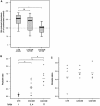Sonic hedgehog is a potent chemoattractant for human monocytes: diabetes mellitus inhibits Sonic hedgehog-induced monocyte chemotaxis
- PMID: 19629560
- PMCID: PMC2789930
- DOI: 10.1007/s00395-009-0047-x
Sonic hedgehog is a potent chemoattractant for human monocytes: diabetes mellitus inhibits Sonic hedgehog-induced monocyte chemotaxis
Abstract
The aim of the present study was to evaluate the expression of hedgehog (Hh) signaling molecules and the chemotactic activity of Sonic hedgehog (Shh) in monocytes from control (CTR) and diabetic patients with or without coronary artery disease (CAD). Previously several studies demonstrated that exogenous administration of Shh can induce angiogenesis and accelerate repair of ischemic myocardium and skeletal muscles. Blood samples were collected from (1) CTR (n = 25); (2) patients with stable CAD without diabetes mellitus (CAD-DM, n = 10); and (3) with stable CAD with DM (CAD+DM, n = 15). Monocytes were isolated by Percoll gradient and subjected to PCR and chemotaxis analysis. Hh signaling molecules were expressed in human monocytes, and Shh-induced monocyte chemotaxis. Shh-stimulated migration of monocytes from CTR measured 172.5 +/- 90% and a maximal stimulation was observed at Shh concentration of 1 microg/ml. However, Shh failed to induce migration of monocytes from CAD+DM (94.3 +/- 27%, P < 0.001 vs. CTR). The impaired response to Shh was associated with strong transcriptional upregulation of the receptor Ptc, while expression of downstream molecules was not altered. Moreover, Ptc is strongly expressed in macrophages of human aortic atherosclerotic plaque. Thus, Shh is a potent chemoattractant for monocytes and it activates classical signaling pathways related to migration. The Shh signaling was negatively affected by DM which might be involved in the pathogenesis of DM-related complications.
Figures





References
-
- Asai J, Takenaka H, Kusano K, Ii M, Luedemann C, Curry C, Eaton E, Iwakura A, Tsutsumi Y, Hamada H, Kishimoto S, Thorne T, Kishore R, Losordo D. Topical sonic hedgehog gene therapy accelerates wound healing in diabetes by enhancing endothelial progenitor cell-mediated microvascular remodeling. Circulation. 2006;113:2413–2424. doi: 10.1161/CIRCULATIONAHA.105.603167. - DOI - PubMed
-
- Barleon B, Sozzani S, Zhou D, Weich H, Mantovani A, Marmé D. Migration of human monocytes in response to vascular endothelial growth factor (VEGF) is mediated via the VEGF receptor flt-1. Blood. 1996;87:3336–3343. - PubMed
-
- Beckers L, Heeneman S, Wang L, Burkly L, Rousch M, Davidson N, Gijbels M, de Winther M, Daemen M, Lutgens E. Disruption of hedgehog signalling in ApoE−/− mice reduces plasma lipid levels, but increases atherosclerosis due to enhanced lipid uptake by macrophages. J Pathol. 2007;212:420–428. doi: 10.1002/path.2193. - DOI - PubMed
-
- Bouma G, Coppens J, Lam-Tse W, Luini W, Sintnicolaas K, Levering W, Sozzani S, Drexhage H, Versnel M. An increased MRP8/14 expression and adhesion, but a decreased migration towards proinflammatory chemokines of type 1 diabetes monocytes. Clin Exp Immunol. 2005;141:509–517. doi: 10.1111/j.1365-2249.2005.02865.x. - DOI - PMC - PubMed
Publication types
MeSH terms
Substances
LinkOut - more resources
Full Text Sources
Medical
Miscellaneous

